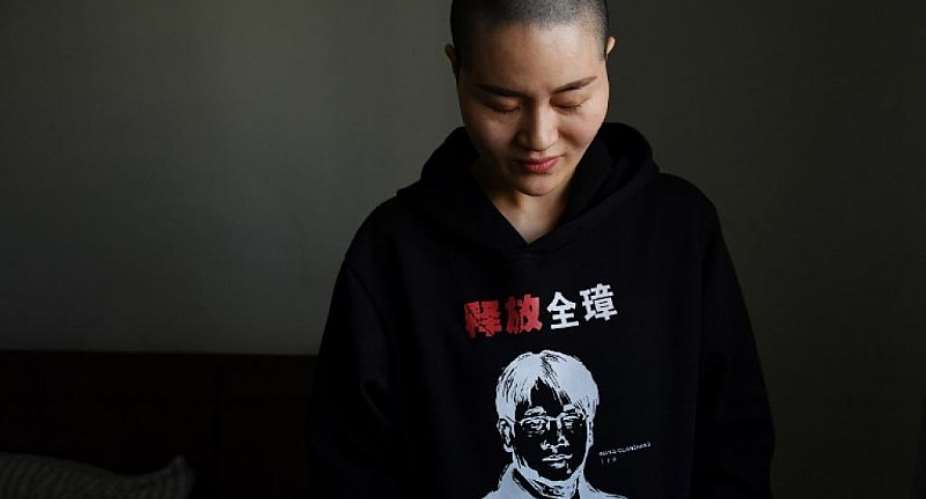Chinese human rights lawyer Wang Quanzhang was sentenced on Monday to four and a half years in prison for state subversion. Wang (42) defended political activists and victims from land seizures. He disappeared in what was called the '709' clampdown in 2015, so called after the date when it started, on July 9.
According to Dublin-based Frontline Defenders, over 300 lawyers and human rights defenders were detained during that action.
In January 2016 Wang was charged with 'subverting state power' which, under article 105 of China's criminal code, is punishable with a prison sentence between 10 years and life.
“Strangely enough, it is a reaction of relief,” Marie Holzman, President of Paris-based Solidarité Chine, told RFI.
“These days people have been sentenced either to life or to ten years, eight years, twelve years. Four and a half years, considering the fact that he has already done three , seems a relatively lenient punishment.
According to Holzman, Wang Quanzhong, who had begun offering legal advice to practitioners of Falun Gong, a spiritual group outlawed by Beijing, as well as to farmers fighting forced evictions, “has nothing to do in jail.”
Good lawyer
“He was a good lawyer, he was a good father, he was a good citizen. And the fact that he's been arrested in 2015 with all the other human rights defenders is extremely shocking."
The sentence means that Wang will be out of jail in the middle of next year as he already served three years in pre-trial detention.
So why this relative “leniency?”
“This is always very hard to understand,” says Holzman.
She mentions Professor Ilham Tohti, an Uyghur activist charged with 'separatism' as well as 'subverting state power'. Tohti, a university professor, was sentenced to life.
The fact that Wang had become 'famous', due to intensive media coverage, and that his wife had lobbied world leaders including German Chancellor Angela Merkel, was a key factor for the relatively lenient sentence, says Holzmann.
The Huawei factor
External factors may play a role as well, according to Holzman.
He cites the case of Chinese telecom giant Huawei, whose CFO was detained in Canada for alleged violations of anti-Iran sanctions before 2015.
“China is now in a relatively difficult position. The US, the EU - everybody is criticizing Huawei.
The 2015 crackdown against human rights lawyers in China didn't silence the lawyers completely, says Holzman. “It was amazing to see when so many big trees fell down, how all the little sprouts were coming out.
“You saw some young lawyers really immediately stepping in and working for clients who were also under the repression by the Chinese Communist Party,” she says.
Many lawyers went abroad, Holzer added. As examples, she cites Teng Biao currently working at the Carr Center for Human Rights Policy of Harvard Kennedy School
Holzer also mentions the family of Gao Zhisheng who frequently 'dissapeared,' and was tortured and jailed. His in-laws fled China and settled in the US as it was “too dangerous" for them to remain in China.
The "Weiquan" movement
In spite of young lawyers taking over, Holzman doesn't think the “old guard” that was rounded up will be able to return to law practice in the near future.
Famous human rights defenders such as civil rights activist Xu Zhiyong, lawyer Pu Zhiqiang and others were members of the loosely organized Weiquan (Defend Rights) movement.
The group helped those facing trouble from the communist authorities, and tried to find solutions in existing laws rather than resorting to strikes and demonstrations which are strictly forbidden.
But Beijing never trusted the lawyers.
In 2004, Weiquan started to ask for leniency for Falun Gong members who were allegedly mistreated in Chinese prisons.
Periodic crackdowns were followed by the '709' actions
“I don't expect to see them working as lawyers in the near future,” says Holzman, talking about those human rights defenders who were released after serving a sentence.
“The punishment goes on. It is not because you are out of jail that you become a normal, free man again in China.”





 Saglemi Housing Project will not be left to rot – Kojo Oppong Nkrumah
Saglemi Housing Project will not be left to rot – Kojo Oppong Nkrumah
 Transport fares hike: GPRTU issue two-day ultimatum
Transport fares hike: GPRTU issue two-day ultimatum
 ARC endorses Alan as presidential candidate – Buaben Asamoa
ARC endorses Alan as presidential candidate – Buaben Asamoa
 Akufo-Addo appoints Kwasi Agyei as new Controller and Accountant-General
Akufo-Addo appoints Kwasi Agyei as new Controller and Accountant-General
 PNC dismiss reports of mass resignations
PNC dismiss reports of mass resignations
 PAC advocates for revenue collectors to be engaged on commission basis, not full...
PAC advocates for revenue collectors to be engaged on commission basis, not full...
 Genser Energy commissions 110km of natural gas pipeline at Anwomaso
Genser Energy commissions 110km of natural gas pipeline at Anwomaso
 Naa Torshie calls for tolerance, peace ahead of 2024 election
Naa Torshie calls for tolerance, peace ahead of 2024 election
 Asantehene commends Matthew Opoku Prempeh for conceiving GENSER Kumasi Pipeline ...
Asantehene commends Matthew Opoku Prempeh for conceiving GENSER Kumasi Pipeline ...
 Let’s do away with ‘slash and burn politics’ in Ghana — Dr Adutwum
Let’s do away with ‘slash and burn politics’ in Ghana — Dr Adutwum
